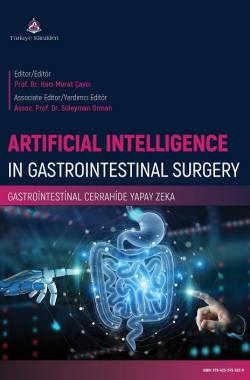ARTIFICIAL INTELLIGENCE (AI) IN EMERGENT GASTROINTESTINAL SURGERY
Habip Sarı
Ankara Etlik City Hospital, Department of Gastroenterological Surgery, Ankara, Türkiye
Sarı H. Artificial Intelligence (AI) in Emergent Gastrointestinal Surgery. Çaycı HM, ed. Artificial Intelligence (AI) in Gastrointestinal Surgery. 1st ed. Ankara: Türkiye Klinikleri; 2025. p.135-143.
ABSTRACT
Artificial intelligence (AI) is bringing great strides into the arena of emergency gastrointestinal (GI) surgery, where fast and accurate decision-making is crucial. As the medical and technological landscape continues to evolve, so does AI, which empowers surgeons in the diagnosis, planning, and execution of complex surgical interventions. In emergencies, where time is of the essence, AI offers substantial benefits, ranging from preoperative assessments to postoperative care. By analyzing substantial amounts of data quickly and accurately, AI can enhance outcomes, reduce risks, and optimize patient recovery.
AI in emergent GI surgery was initially applied in diagnostics. Machine learning algorithms can analyze medical imaging, including computed tomography (CT) scans, magnetic resonance imaging (MRI), and endoscopic images, for evidence of GI emergencies such as perforations, obstructions, or bleeding. These algorithms can identify abnormalities much faster than traditional methods, providing doctors with a much clearer view of internal conditions, especially in urgent situations when each second counts.
In the operating room, AI-enhanced robotic systems are taking hold. Using AI to provide real-time guidance improves precision in minimally invasive surgeries. Surgeons can navigate complex anatomical structures with less human error, as technology guides them through the anatomy. This assistance may also help in making decisions. This has been invaluable in cases requiring quick, split-second decisions during emergencies, as the technology adjusts for the complexity of a given case.
AI’s role extends beyond surgery. During postoperative care, AI algorithms monitor patients’ recovery by tracking vital signs and lab results while predicting complications such as infections, bleeding, or organ failure. This allows for early interventions, reducing the risk of complications and improving overall recovery times. Furthermore, AI-based systems are used for continuous training, helping surgeons practice critical scenarios through simulations and virtual training environments, thus ensuring they are prepared for emergencies.
In conclusion, AI has a notable impact on emergency gastrointestinal surgery. AI is poised to transform this field by improving diagnostic accuracy, streamlining surgical procedures, and optimizing postoperative care. It improves diagnostic accuracy, supports personalized surgical planning, offers valuable intraoperative assistance, and paves the way for future progress. As AI technology continues to evolve, its role in GI surgery is expected to expand, offering even greater opportunities for improving patient outcomes and the efficiency of surgical interventions. Ultimately, artificial intelligence is revolutionizing the methodology of surgical procedures and the approach to patient care, fostering the creation of more efficient, effective, and individualized medical interventions.
Keywords: Emergent gastrointestinal surgery; Artificial intelligence; Algorithms; Ethical considerations in AI
Kaynak Göster
Referanslar
- Cullison KM, Franck N. Clinical decision rules in the evaluation and management of adult gastrointestinal emergencies. Emerg Med Clin North Am. 2021;39(4):719-32. [Crossref] [PubMed]
- Patterson JW, Kashyap S, Dominique E. Acute Abdomen. In: StatPearls. Treasure Island (FL): StatPearls Publishing; July 10, 2023. [Link]
- Nally DM, Sørensen J, Valentelyte G, et al. Volume and in-hospital mortality after emergency abdominal surgery: a national population-based study. BMJ Open. 2019;9(11):e032183. Published 2019 Nov 2. [Crossref] [PubMed] [PMC]
- Solanki SL, Pandrowala S, Nayak A, Bhandare M, Ambulkar RP, Shrikhande SV. Artificial intelligence in perioperative management of major gastrointestinal surgeries. World J Gastroenterol. 2021;27(21):2758-2770. [Crossref] [PubMed] [PMC]
- Rimmer L, Howard C, Picca L, Bashir M. The automaton as a surgeon: the future of artificial intelligence in emergency and general surgery. Eur J Trauma Emerg Surg. 2021;47(3):757- 762. [Crossref] [PubMed]
- Gumbs AA, Alexander F, Karcz K, Chouillard E, Croner R, Gagner M et al. White paper: Definitions of artifcial intelligence and autonomous actions in clinical surgery. Art Int Surg. 2022;2:93-100. [Crossref]
- Laterza V, Marchegiani F, Aisoni F, et al. Smart Operating Room in Digestive Surgery: A Narrative Review. Healthcare (Basel). 2024;12(15):1530. Published 2024 Aug 1. [Crossref] [PubMed] [PMC]
- Schlanger D, Graur F, Popa C, Moiș E, Al Hajjar N. The role of artificial intelligence in pancreatic surgery: a systematic review. Updates Surg. 2022;74(2):417-429. [Crossref] [PubMed]
- Rudiman R. Minimally invasive gastrointestinal surgery: From past to the future. Ann Med Surg (Lond). 2021;71:102922. Published 2021 Oct 8. [Crossref] [PubMed] [PMC]
- Suri C, Pande B, Sahu T, Sahithi LS, Verma HK. Revolutionizing Gastrointestinal Disorder Management: Cutting-Edge Advances and Future Prospects. J Clin Med. 2024;13(13):3977. Published 2024 Jul 8. [Crossref] [PubMed] [PMC]
- Guni A, Varma P, Zhang J, Fehervari M, Ashrafian H. Artificial Intelligence in Surgery: The Future is Now. Eur Surg Res. Published online January 22, 2024. [Crossref] [PubMed]
- Jaideep V. AI in Emergency Management: Ethical Considerations and Challenges. Journal of Emergency Management and Disaster Communications. 2024;5(1):165-183. [Crossref]
- Jung A. Machine Learning: The Basics. Machine Learning: Foundations, Methodologies, and Applications. Springer. 2022. [Crossref]

